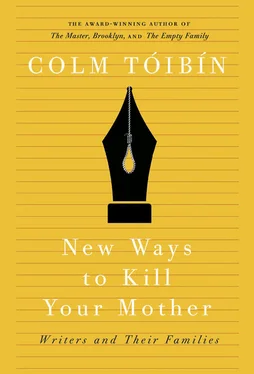Johnnie is at home still. He has to get those large glands taken out of his neck, poor fellow. It is very unpleasant… Since his hair fell out he got cold in the glands, and they became so large they were, or rather are, quite disfiguring to him. He has been very anxious to go away to Paris. He has been advised by his friend Yeats, the Irish poet, to go in for reviewing French literature so John is working away with that end in view. His general health is very good and he is strong and able to walk, so I trust he may get over this time well, please God, and Oh I do ask Him to reveal Himself to my dear boy.
It is interesting that there is no mention here of the Aran Islands. The operation took place in December 1897. The doctors must have known that the symptoms could recur, but they told Synge and his mother, who both seemed to have believed them, that it was a success. His mother watched over him. On 3 January 1898 she noted in her diary: ‘John not well — made me anxious.’ Two days later she wrote to Robert: ‘Johnnie looks much better, but he is not strong, and I am anxious lest he should go to Paris too soon and be laid up again in some way, as the Hotel life is anything but comfortable or healthy. He is very silent, poor fellow, and spends all his time over his books except when he goes out for a walk.’ When he went back to Paris, writing fragmentary beginnings to a novel and attending lectures by a French professor on the connections between Irish and Greek literature, his mother wrote: ‘I heard from Johnnie; troubled by bugs.’
On 23 April 1898 he came home. The difference between his life in Paris, where he spoke fluent French, lived alone and was deeply respected by his many associates, and his life in his mother’s house, must have made him wonder. At least three times a day for meals in Ireland he had to listen to Mrs Synge and her friends and other members of the family on the subject of religion and domestic life and their narrow political prejudices. She was teaching her grandchildren the Bible as she had taught her children, seeing it as part of her duty, according to Edward Stephens, to emphasize the horror of eternal damnation. ‘Sometimes,’ Stephens wrote,
our lessons were interrupted by his [Synge’s] entering the room. I remember particularly his coming in once when we were having a Bible reading. He was twirling his pocket scissors on his finger chanting softly to himself, ‘Holy, Holy, Holy Moses.’ We greeted him and he sat in the window for a few minutes and then, feeling that he had caused an interruption, went quietly out again. Our grandmother said: ‘Don’t put down your Bibles when Uncle John comes in,’ and resumed her reading.
In Paris, he was the earnest playboy of the western world; in Kingstown he was his mother’s youngest son.
Just before Synge’s first visit to the Aran Islands, he had a meeting with Cherrie Matheson, who told him that their differences were irreconcilable. Two days later, he called to her house and had what must have been a deeply dispiriting conversation with Cherrie and her mother. Mrs Matheson, according to Edward Stephens, ‘with Cherrie’s approval, rated him soundly for pressing a rejected proposal of marriage when he was not earning enough money to support himself. He left in despair… His mind was still distraught with anguish when, on the morning of Monday 9 May 1898, he left by the morning train for Galway.’
He wrote of his visits to the islands over the next few years with beauty and reverence and restraint. It must have been a relief that first morning watching the sailors casting off in a fog from Galway pier and arriving in Aranmore after a three-hour journey, no one there knowing anything about Cherrie Matheson and her hectoring mother, or Mrs Synge’s worries about her poor Johnnie. He was now in the land of his dreams. Lady Gregory saw him on the island in 1898; she was in search, too, of nourishment from a primitive world that contained an astonishing life force and an ancient culture. She wrote:
I first saw him in the North Island of Aran. I was staying there, gathering folklore, talking to the people, and felt a real pang of indignation when I passed another outsider walking here and there, talking also to the people. I was jealous of not being alone on the island among the fishers and the seaweed gatherers. I did not speak to the stranger nor was he inclined to speak to me. He also looked on me as an intruder.
Later, she wrote about his work once he had arrived on the islands. He had, she wrote, ‘done no good work until he came back to his own country. It was there that he found all he wanted, fable, emotion, style… bringing a cultured mind to a mass of primitive material, putting clearer and lasting form to the clumsily expressed emotion of a whole countryside.’
Soon, he was invited to Coole and quickly joined the movement that resulted in the Abbey Theatre. He became, eventually, with Yeats and Lady Gregory, one of the three directors. He wrote five plays for them — The Shadow of the Glen (1903); Riders to the Sea (1904); The Well of the Saints (1905); The Tinker’s Wedding (1907); The Playboy of the Western World (1907). He left one play unfinished, Deirdre of the Sorrows , which was first produced, in a completed version, in 1910. His imagination was powerfully autonomous; his plays combined the knowledge he had amassed through his study and his wanderings in Europe with a real openness and freedom and an immense natural talent. He delighted in language and character, in wild talk and massive abandon, as though he were concerned to dramatize and most portray what he himself in his own life kept in abeyance.
In these eleven years he took part in all the rows that ran at the theatre, seeming much of the time calmer, more focused, less vindictive and, on some matters, more determined than his colleagues. He believed that Yeats was too impetuous to deal with the actors. In some of the correspondence, as Roy Foster has pointed out, ‘he sounds both older and wiser than Yeats; he appears more at ease in dealing with people.’ In 1908, when the Fays had left the theatre, Synge remarked: ‘Since then Yeats and I have been running the show, i.e. Yeats looks after the stars and I do the rest.’ The actors and workers in the theatre liked him. He appeared more natural, more in possession of himself than either of his colleagues. An Australian visitor in 1904 described him: ‘He was full of race and good breeding, courteous, sensitive, sincere… a simple man; but there was something strange and alluring about him, an indescribable charm expressed in his voice and manner and, above all, in his curious smile that was at the same time ironic and sympathetic.’ With the Abbey, as with his family, Synge was skilled at withdrawing. ‘I have often envied him his absorption,’ Yeats wrote, ‘as I have envied Verlaine his vice.’
Lady Gregory disliked The Playboy of the Western World , although she defended it in public. She made sure that Yeats’s play The Pot of Broth was not used as a curtain-raiser, which would be, she wrote to Yeats, foreseeing the riots, like ‘Synge setting fire to your house to roast his own pig’. After Synge’s death, she wrote a passage in her journal that she did not publish: ‘One doesn’t want a series of panegyrics and we can’t say, don’t want to say what was true, he was ungracious to his fellow workers, authors and actors, ready in accepting praise, grudging in giving it… On tour he thought of his own play only, gave no help to ours and if he repeated compliments, they were to his own.’ Yeats in his journal wrote: ‘I never heard him praise any writer, living or dead, but some old French farce-writer.’
The truth was that he understood the value of his own plays and did not rate very highly the work of Yeats or Lady Gregory for the theatre, although he admired other aspects of their work, such as Lady Gregory’s translations. He made no secret of this, and of his profound irritation at Lady Gregory’s tireless and fearless promotion of Yeats’s work and her constant production of her own work. In December 1906 she told Synge that Yeats’s dramatic work ‘was more important than any other (you must not be offended at this) as I think it our chief distinction’. In March 1907, when The Playboy of the Western World had already been produced and Charles Frohman, an American producer, came to the Abbey looking for new work to tour in the US, Synge wrote to Molly Allgood:
Читать дальше












